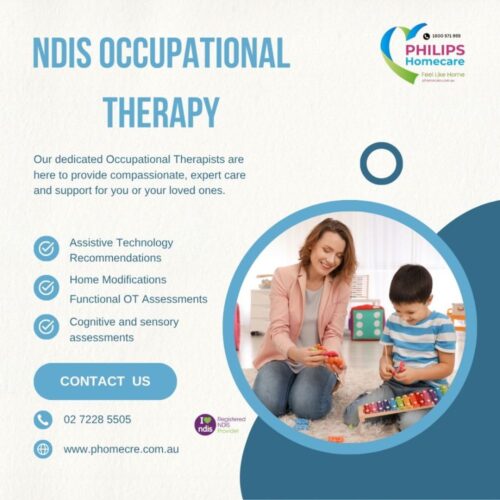
How NDIS OT Helps Children with Developmental Delays
- City: Sydney
- State: New South Wales
- Country: Australia
- Zip/Postal Code: 2205
- Contact No: 02 72285505
- Email ID: [email protected]
- Website: https://www.phomecare.com.au/2024/08/22/ndis-occupational-therapy-support/
- Listed: May 14, 2025 6:33 am
- Expires: 28 days, 16 hours
Description
Children with developmental delays often face challenges in reaching milestones that typically developing children achieve. These delays can impact a child’s ability to perform everyday tasks, such as dressing, feeding, or even playing. This can lead to frustration and a lack of confidence, affecting their overall development. NDIS Occupational Therapy (OT) is an essential service that supports children with developmental delays, helping them to improve their skills, increase independence, and participate more fully in everyday activities.
What is NDIS Occupational Therapy?
NDIS Occupational Therapy (OT) is a specialized therapy designed to help children with developmental delays achieve their full potential. It focuses on improving a child’s ability to engage in daily activities, or “occupations,” which can include anything from basic self-care tasks to social and play activities. Occupational therapists assess a child’s strengths and weaknesses and create individualized therapy plans that address the child’s specific needs. These plans are designed to help children develop the skills required for independent living, improve their motor skills, and enhance their social interactions.
How NDIS Occupational Therapy Supports Children with Developmental Delays
NDIS occupational therapy is a comprehensive and flexible service that can be tailored to the needs of each child. For children with developmental delays, it focuses on several key areas that are essential for healthy growth and development:
1. Improving Motor Skills
A common challenge for children with developmental delays is the difficulty in developing fine and gross motor skills. These skills are necessary for performing everyday tasks such as eating, dressing, writing, or even playing sports. NDIS occupational therapy helps children improve their motor coordination, strength, and balance through targeted exercises and activities. Occupational therapists often use play-based techniques to encourage children to develop these skills in a fun and engaging way, ensuring that therapy feels less like work and more like an enjoyable activity.
2. Enhancing Sensory Processing Abilities
Children with developmental delays may struggle with sensory processing, meaning they can become easily overwhelmed by sensory stimuli or have difficulty responding to sensory information in an appropriate manner. NDIS occupational therapy helps children become more comfortable with sensory experiences, whether it’s touch, sound, light, or movement. Therapists work with children to help them better regulate their sensory responses, making it easier for them to engage with their environment and participate in activities without becoming overstimulated.
3. Fostering Independence in Daily Tasks
Children with developmental delays often require assistance with daily tasks, such as dressing, feeding, grooming, or using the toilet. NDIS occupational therapy plays a crucial role in helping children develop the skills they need to perform these tasks independently. Therapists use adaptive techniques and equipment to help children learn how to manage daily routines and activities on their own. These skills not only help children gain confidence but also improve their ability to participate in family and social activities.
4. Supporting Social Skills Development
Many children with developmental delays face challenges in social situations. They may have trouble understanding social cues, making friends, or interacting appropriately with peers and adults. NDIS occupational therapy helps children develop essential social skills, such as taking turns, sharing, communicating effectively, and understanding nonverbal cues. By practicing these skills in a supportive, structured environment, children can build stronger relationships with others and develop greater social confidence.
5. Customizing Therapy Plans to Individual Needs
One of the greatest benefits of NDIS occupational therapy is the personalized approach it offers. Occupational therapists work closely with families to create individualized therapy plans tailored to the unique needs and goals of each child. These plans are flexible and can evolve as the child grows and their needs change. NDIS occupational therapy allows children to receive ongoing support, ensuring they continue to make progress and achieve their developmental goals.
6. Promoting Emotional Wellbeing
Children with developmental delays may experience frustration, anxiety, or low self-esteem due to their challenges. NDIS occupational therapy not only addresses physical and functional development but also focuses on emotional wellbeing. Therapists work with children to build resilience and coping strategies, helping them manage emotions and face challenges with a positive outlook. By fostering emotional strength, children are better equipped to handle the demands of daily life and build self-confidence.
The Role of Families in NDIS O
3 total views, 2 today